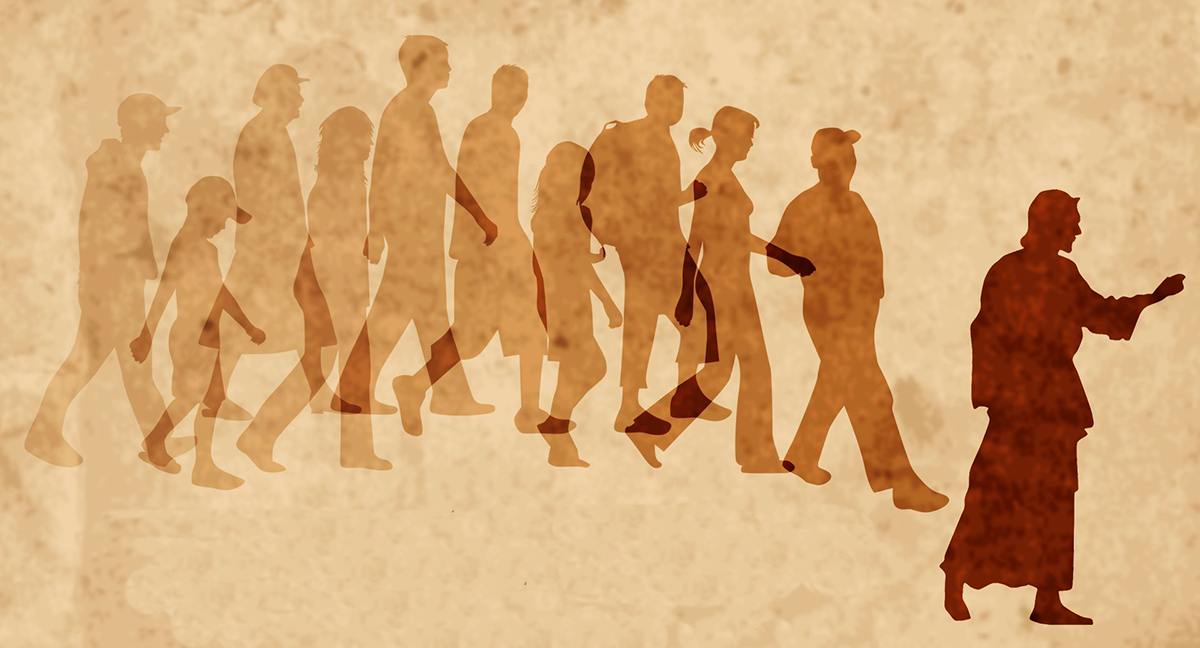Thirteenth Sunday after Pentecost, Gospel Year C
A LINE IN THE SAND
Luke 14:25-33
Thirteenth Sunday after Pentecost
Analysis by Marcus Felde
Now large crowds were traveling with [Jesus]; and he turned and said to them, 26 “Whoever comes to me and does not hate father and mother, wife and children, brothers and sisters, yes, and even life itself, cannot be my disciple. 27 Whoever does not carry the cross and follow me cannot be my disciple. 28 For which of you, intending to build a tower, does not first sit down and estimate the cost, to see whether he has enough to complete it? 29 Otherwise, when he has laid a foundation and is not able to finish, all who see it will begin to ridicule him, 30 saying, ‘This fellow began to build and was not able to finish.’ 31 Or what king, going out to wage war against another king, will not sit down first and consider whether he is able with ten thousand to oppose the one who comes against him with twenty thousand? 32 If he cannot, then, while the other is still far away, he sends a delegation and asks for the terms of peace. 33 So therefore, none of you can become my disciple if you do not give up all your possessions.
Author’s Note: Jesus drew and redrew a line in the sand. That reminds me of Colonel Travis at the Alamo. Travis invited the men to step across the line he drew in the dirt with his sword if they were willing to fight to the death and lose their lives in a battle over territorial dominion. Jesus drew a line . . . and invited people to surrender. To sue for terms of peace. (v. 32) To give up possessions, family, “even life itself” (v. 27), so that they might become Jesus’ disciples and thereby enjoy what 1 Timothy 6:19 calls “the life that is really life.”
DIAGNOSIS: In Over Our Heads
Step 1: Initial Diagnosis (External Problem): Unable to Finish “The Job”
We human beings strive to “make a life” for ourselves, to “get a life,” to organize our private versions of peace (aka success). “Tower” and “waging war” are metaphors for that Great Task. We decide what we want to be, what we want to do, what we want to have. We set priorities. We start things. We take up projects. We protect our proposals. We buckle down. We fix what is wrong, so our world will be all right. It’s hard.
Step 2: Advanced Diagnosis (Internal Problem): Gods That Are Not Really God
We sense that life truly ought to be about “one thing,” as Curly (the sagebrush sage) said to Billy Crystal’s character in “City Slickers.” However, Curly was agnostic about what that one thing is. He left it to Billy to discover for himself.
Jesus agrees with the first notion. (See the First Commandment.) The trouble is, if that “one thing” is our possessions, or even our family, or “life itself,” no matter how precious that “one thing” is to us, it cannot support life forever, only for a while. It is not enough. We are subordinating our life to something or some things that are of less value than life itself, instead of something (God) greater than life itself.
Step 3: Final Diagnosis (Eternal Problem): Ruin and Ridicule
Inevitably, ruin awaits us if we live for less. If we live a life that is not really life. And with ruin rides ridicule: “All who see it will begin to ridicule” us (v. 29). We will have made a calamitous miscalculation.
PROGNOSIS: “Terms of Peace”
Step 4: Initial Prognosis (Eternal Solution): Peace Is to Be Had
The gospel in this passage comes in a surprising manner. Jesus hints that “terms of peace” are available (v. 32). Perhaps he is even suggesting that he will lead the delegation which asks for the terms of peace? We know from the Gospel that God has made peace through the blood of the cross (Col. 1:20). Taking up the cross-that-makes-peace-with-God (not the cross-that-makes-our-lives-so-miserable) and following Jesus (v. 27), we obtain what our ten thousand troops could not have: peace.
Step 5: Advanced Prognosis (Internal Solution): Leaving and Following
Look up the Greek word (apotasso) for “give up,” as in “give up all your possessions” (v. 33). The verb is generally used to denote leave-taking. Saying goodbye. “Following Jesus” does not primarily mean traveling (although it might involve some of that, too). It means saying goodbye to our own ideas, and keeping our eye on the God that Jesus is to us, wherever we are. Likewise, “giving up” all our possessions, and even our family and our life, does not primarily mean ridding ourselves of them. It means no longer relying on them to be God for us. When (by the grace of God, through faith in Jesus) we step over Jesus’ line in the sand, we are putting our lives under someone who is 1) actually greater than our lives, and 2) is able to support our life. Forever.
Step 6: Final Prognosis (External Solution): Successful Life
If I were preaching this Gospel reading, I think I would turn at the end to the second reading appointed for this day: Philemon. Paul is concretely describing to his friend Philemon how different our lives are when we are transformed by the renewing of our minds through faith in Jesus Christ. All of us—not only Onesimus but also Philemon, and you and me—will lead lives that are really life, when we love and serve one another willingly, as children of God and brothers and sisters of one another. This life of peace is rooted in the terms of cross-peace, by which we drop the pretense of our own dominion over our “own” lives, and recognize Jesus at work in us by his Spirit. We won’t fail. We will do even greater works than Jesus did, when we believe his promise in John 14:12. If you don’t want to use Philemon, maybe refer to the 1 Timothy 6 context of “the life that is really life,” and notice how it includes being rich in good works, generous, and ready to share?
(P.S.: At the end of “City Slickers,” Billy Crystal’s character says to his wife that he “found his smile.” That sounds nice. But imagine finding peace with God!)

